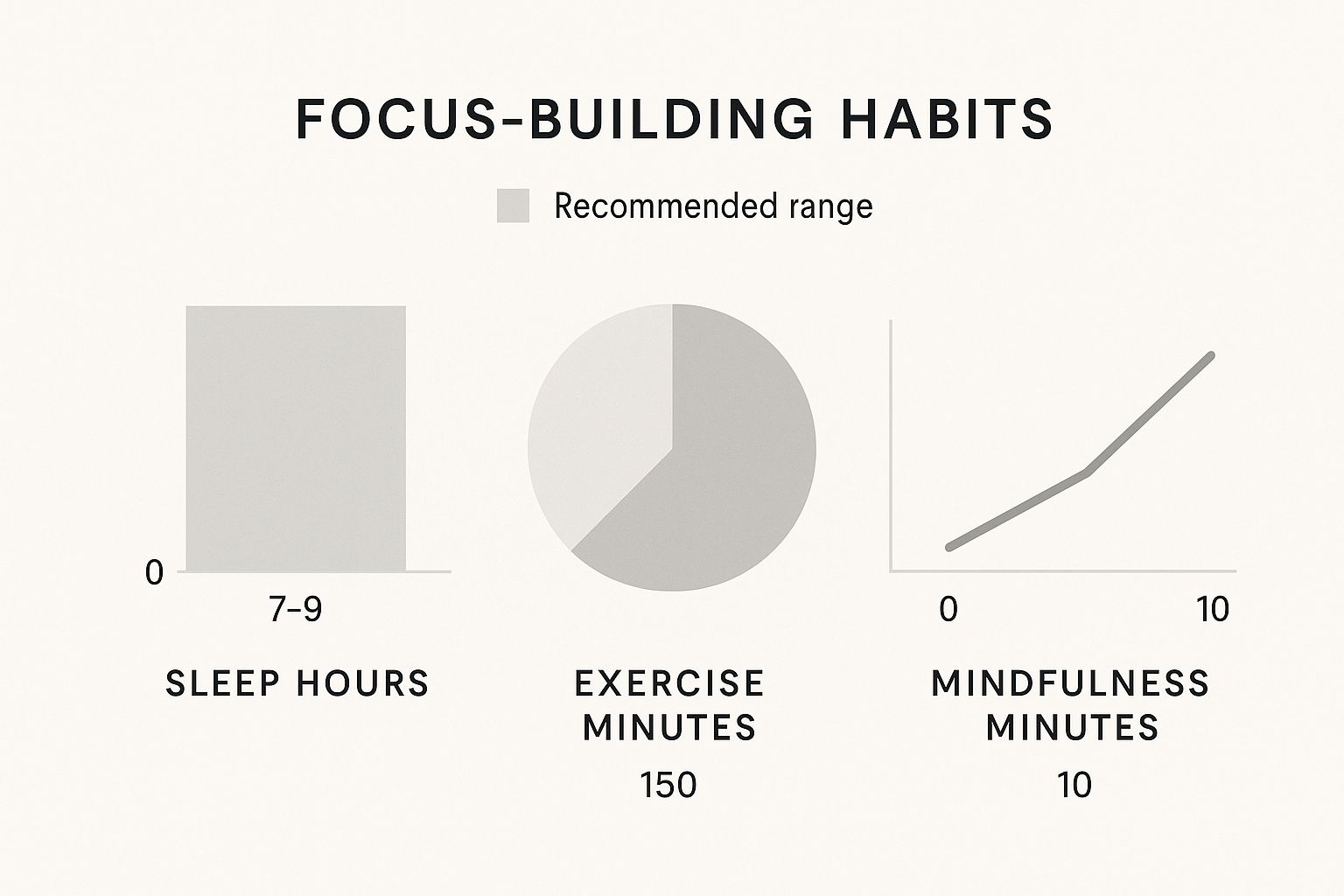
How to Improve Focus and Boost Concentration
Share
If you feel like your ability to concentrate has taken a nosedive, you’re not alone. It’s a common struggle in our modern world, where demands on our attention are relentless and the pace of life just seems to keep accelerating.
First things first: this isn’t a personal failing. It’s a symptom of the environment we live in. Our brains are constantly bombarded with information, notifications, and the pressure to be ‘always on’. This constant stimulation actually trains our minds for distraction, making deep, sustained focus feel like a monumental task.
Why Is It So Hard to Focus Right Now?

To start fixing the problem, you first have to understand what's causing it. Three big culprits are constantly working against our ability to concentrate.
The Myth of Multitasking
So many of us wear multitasking as a badge of honour, believing we're being more productive by juggling several things at once. The truth? Cognitive science tells a very different story. The human brain simply isn’t designed to focus on multiple complex tasks at the same time.
What you think is multitasking is actually rapid task-switching. Every time you switch—from writing a report to checking an email to answering a message—your brain pays a cognitive price. This constant fragmentation of your attention leads to more errors, kills your efficiency, and leaves you feeling mentally drained.
True productivity isn't about doing more things at once. It's about doing one thing with your full, undivided attention. When we abandon the myth of multitasking, we open the door to deeper, more meaningful work.
The impact of this is huge. For example, some data suggests the average UK worker is actively productive for only about 2 hours and 53 minutes during an 8-hour day. That means less than 36% of the working day is spent on truly focused tasks, which is a massive gap between time spent at work and actual output.
Digital Distractions and the Attention Economy
Our digital tools, as useful as they are, have a dark side: they are engineered to capture and hold our attention. Social media feeds, news alerts, and endless notifications create a state of perpetual distraction. Each ping and buzz delivers a tiny hit of dopamine, reinforcing the habit of checking our devices again and again.
This creates a vicious cycle:
- Constant Interruption: Digital alerts pull you out of deep work, forcing your brain to constantly re-focus.
- Shrinking Attention Span: Over time, our brains adapt to this rapid-fire stimulation, making it harder to engage in long-form reading or complex problem-solving.
- Mental Clutter: The sheer volume of information we consume leaves our minds feeling cluttered and overwhelmed, a major barrier to clear thinking.
Stress, Burnout, and Cognitive Load
Beyond the digital world, chronic stress and mental fatigue play a huge role in our inability to focus. When you're stressed, your body releases cortisol, a hormone that, in high amounts, can directly impair cognitive functions like memory and concentration.
Think of your brain's capacity for focus as a finite resource. Every decision you make, every worry you entertain, and every task you manage adds to your cognitive load. When that load gets too heavy, your ability to direct your attention where you want it simply plummets. To really improve your focus, it's helpful to first understand the underlying issues; you can delve deeper into the common reasons why you might be struggling to focus to get more clarity.
By recognising these modern challenges—the multitasking myth, digital overload, and the impact of stress—you can start to reclaim your attention. Understanding the root cause is the first step toward implementing the practical strategies that follow in this guide.
Design Your Environment for Deep Work

Your ability to concentrate is hugely influenced by the world around you. A space filled with clutter and constant pings is a recipe for a scattered mind. On the flip side, a thoughtfully organised environment can be a powerful trigger for deep, focused work.
Engineering your surroundings—both physical and digital—is one of the most direct and effective ways to sharpen your focus. This isn't just about having a tidy desk; it's about sending clear signals to your brain. When you step into a space designed for concentration, it primes you mentally, making it far easier to slip into a state of flow.
Crafting Your Physical Focus Zone
Your workspace should be a sanctuary for concentration, not a battleground of distractions. The first step is to define a specific area dedicated solely to focused tasks. If you work from home, this might be a separate room or even just a designated corner of your living space. The goal is to build a powerful mental link: this spot means it's time to work.
This very principle is one reason hybrid working has taken off. In the UK, recent data shows that 52% of employees in hybrid roles reported a boost in productivity, often because they could create a more controlled and focused home environment. A dedicated, quiet workspace can make deep concentration feel effortless compared to a busy open-plan office. You can find more insights on how our work environments affect productivity from the Office for National Statistics.
Once you've carved out your zone, optimise it with these things in mind:
- Embrace minimalism. Get rid of anything on your desk that isn’t absolutely essential for the task at hand. Every spare object is a potential distraction waiting to pull your attention away.
- Get comfortable. An awkward chair or a poorly angled screen creates physical friction that chips away at your mental energy. Invest in a setup that supports your body, freeing up your mind to focus entirely on the work.
- Let there be light. Natural light is the gold standard for boosting alertness and mood. If that’s not an option, go for cool, bright lighting that mimics daylight to help keep your energy levels up.
Taming Your Digital Environment
Let's be honest, the biggest threats to our focus today are usually digital. Your computer and phone are incredible tools, but their default settings are built for interruption, not deep work. It's time to actively reclaim your digital space.
Start with a full notification audit. Go through every single app on your phone and computer and turn off all non-essential alerts. Banners, badges, and sounds are literally engineered to hijack your attention. Be ruthless—do you really need to know the second someone likes your photo?
Your attention is your most valuable asset. Protect it fiercely by building a digital fortress that only lets in what truly matters. Silencing notifications isn't about being unresponsive; it's about being intentional with your time.
Next, treat your digital desktop like your physical one. A screen cluttered with dozens of files and open tabs creates a sense of overwhelming chaos. Use folders to group related items and, most importantly, close all the tabs and apps that aren't relevant to what you're doing right now.
Leveraging Sound and Scent
Don't overlook the power of what you can hear and smell. The right ambient conditions can make a surprising difference to your ability to concentrate.
- White Noise or Ambient Sounds: Tools that play sounds like gentle rain, a humming café, or simple white noise can be brilliant for masking distracting background chatter and helping your brain settle.
- Focus-Enhancing Music: For many of us, instrumental music—think classical, electronic, or lo-fi beats—can improve concentration by providing a steady, non-distracting soundtrack to work to.
- Strategic Silence: Then again, sometimes the best sound is no sound at all. A quality pair of noise-cancelling headphones can be one of the best investments you make, especially if you're in a noisy office or a busy home.
Finally, give some thought to scent. Certain smells, like rosemary, peppermint, or citrus, have been shown to have an energising effect that can sharpen mental clarity. A simple essential oil diffuser can be a subtle but surprisingly effective addition to your focus-friendly environment. By consciously designing these elements, you create a space that works with you, not against you, in your quest for sustained concentration.
Adopt Habits That Build a Focused Mind
While a perfectly organised desk can set the stage for concentration, lasting focus is built from the inside out. The daily habits you cultivate—how you sleep, manage stress, and move your body—form the very foundation of your cognitive health.
Think of these as the non-negotiable pillars that support a sharp, resilient, and focused mind. It's not about a quick fix, but about creating a lifestyle where your brain has the resources it needs to perform at its best. By addressing these core areas, you can shift your default state from distracted and overwhelmed to clear and engaged.
Prioritise Restorative Sleep
Sleep is your brain's ultimate reset button. It’s during these crucial hours that your mind clears out metabolic waste, consolidates memories, and restores the neural pathways essential for attention. When you consistently fall short on sleep, you start each day with a significant cognitive deficit.
A well-rested brain is a focused brain. Aiming for 7-9 hours of quality sleep per night isn't a luxury; it's a fundamental requirement for peak mental performance. If you struggle to hit that target, improving your sleep hygiene can make a world of difference.
Here are a few practical strategies to try tonight:
- Create a consistent schedule. Going to bed and waking up around the same time every day—even on weekends—helps regulate your body's internal clock.
- Design a wind-down routine. An hour before bed, switch off screens, dim the lights, and do something calming like reading a book or some gentle stretching. This signals to your brain that it's time to rest.
- Optimise your bedroom. Keep your room cool, dark, and quiet. Blackout curtains and a white noise machine can be incredibly effective.
Manage Stress Before It Manages You
Chronic stress is a major enemy of focus. When you're constantly in a state of high alert, your brain is flooded with cortisol, which can disrupt executive functions like concentration and short-term memory. Learning to manage stress isn't just about feeling better; it's about protecting your cognitive resources.
One of the most powerful tools for this is mindfulness. This practice involves paying attention to the present moment without judgement. Even just 10-15 minutes of mindfulness meditation each day can train your brain to better regulate its attention and resist getting carried away by distracting thoughts.
Stress and distraction are two sides of the same coin. When your mind is calm and centred, your ability to direct your attention where you want it becomes exponentially stronger.
Strategic breaks are another critical habit. Pushing through mental fatigue is just counterproductive. Instead, schedule short, regular breaks away from your screen to recharge. This could be a five-minute walk, a few deep breaths by a window, or simply stepping away to make a cup of tea.
The infographic below shows how these small, consistent habits add up.

This really highlights that you don't need a monumental effort to see huge cognitive benefits. What matters most are consistent, manageable commitments.
Move Your Body to Sharpen Your Mind
The link between physical activity and brain health is undeniable. Regular exercise boosts blood flow to the brain, delivering essential oxygen and nutrients that support cognitive function. It also stimulates the release of brain-derived neurotrophic factor (BDNF), a protein that encourages the growth of new brain cells.
You don't need to spend hours in the gym to reap the benefits. Aiming for around 150 minutes of moderate-intensity exercise per week is a great target.
This could look like:
- Brisk walking or jogging
- Cycling
- Swimming
- Dancing
Incorporating movement is also a fantastic way to improve work-life balance, which is a key driver of mental health for UK workers. Recent data shows that 53% of remote workers in the UK feel that schedule flexibility helps them achieve a better balance, which in turn positively impacts their focus. You can find out more by exploring these work-life statistics.
Building these foundational habits—sleep, stress management, and exercise—creates a powerful synergy that reinforces your ability to concentrate day after day.
Fuel Your Brain for Peak Performance
Just like a world-class athlete meticulously plans their meals before a big competition, you need to fuel your brain for peak mental performance. What you eat has a direct and profound impact on your energy levels, mental clarity, and your ability to concentrate. It’s pretty simple when you think about it: your brain is an incredibly energy-hungry organ, and giving it the right nutrients is non-negotiable for sustained focus.
It all begins with what’s on your plate every day. The main goal is to sidestep those sharp spikes and dreaded crashes in blood sugar that leave you feeling foggy and completely unfocused. By building your meals around a balance of lean proteins, healthy fats, and complex carbohydrates, you provide a steady, reliable stream of energy. That’s the secret to maintaining concentration from morning to night.
The Foundations of a Brain-Boosting Diet
Before we even get into supplements, we have to get the basics right. Think of your diet as the solid foundation you build your mental clarity on. A diet packed with certain nutrients can protect your brain, support the lightning-fast communication between neurons, and provide the raw materials for it to function at its best.
Here are the key food groups you’ll want to prioritise:
- Healthy Fats: Foods rich in omega-3 fatty acids are absolutely crucial. Think salmon, walnuts, and flaxseeds. These fats are literally the building blocks of your brain cell membranes.
- Antioxidants: Berries, dark chocolate (the good stuff!), and leafy greens are loaded with antioxidants. These compounds act like bodyguards for your brain cells, protecting them from damage caused by oxidative stress.
- Key Micronutrients: A whole host of vitamins and minerals are involved in keeping your brain running smoothly. B vitamins, for instance, play a massive role in producing the energy your brain cells need to work efficiently.
When you focus on whole, nutrient-dense foods, you're giving your brain a consistent supply of the exact fuel it needs to stay sharp.
Strategic Supplementation for an Extra Edge
While a solid diet is your first and best line of defence, targeted supplements can offer some serious support. They're fantastic for filling any nutritional gaps and providing specific compounds known to boost cognitive function. They act as specialised tools to help sharpen your mental edge when you need it most.
Creatine is a classic example. Most people associate it with building muscle, but its benefits for the brain are genuinely profound. It plays a key role in recycling cellular energy, helping your brain maintain high energy levels during mentally demanding tasks. This can translate to better short-term memory and sharper reasoning, especially when you're under pressure.
Magnesium is another mineral that's absolutely critical for cognitive performance. It’s involved in over 300 biochemical reactions in the body, including many that support nerve transmission and brain plasticity. Getting enough magnesium can help calm the nervous system, making it much easier to settle into that state of deep, uninterrupted focus.
Think of supplements as cognitive allies. They aren't a replacement for healthy habits, but they can provide the specific support your brain needs to manage stress, produce energy, and communicate more effectively.
If you find yourself dealing with stress-induced brain fog, Ashwagandha is an exceptional adaptogen. It helps your body manage its stress response by regulating cortisol levels. By fostering a sense of calm and resilience, ashwagandha can free up the mental resources you need for deep concentration.
Finally, functional mushroom blends, featuring powerhouses like Lion's Mane and Cordyceps, are gaining well-deserved recognition for their nootropic effects. Lion's Mane, in particular, has been studied for its ability to stimulate the production of nerve growth factor (NGF), which is vital for the health and communication of your brain cells.
Key Supplements for Cognitive Enhancement
Choosing the right supplement really comes down to your specific needs and lifestyle. To make things a bit clearer, here’s a quick comparison of some of the heavy hitters and how they can help improve your focus.
| Supplement | Primary Cognitive Benefit | How It Works |
|---|---|---|
| Omega-3s | Supports long-term brain health and memory. | Provides the structural components for brain cell membranes, improving cell communication. |
| Creatine | Boosts mental energy and processing speed. | Aids in the rapid production of ATP (cellular energy) in the brain during intense cognitive effort. |
| Magnesium | Enhances neural communication and reduces mental fatigue. | Plays a vital role in nerve signal transmission and helps regulate neurotransmitters that promote calmness. |
| Ashwagandha | Improves stress resilience and reduces mental clutter. | Acts as an adaptogen, helping to modulate the body's cortisol response to stress. |
| Mushroom Blends | Promotes neural health and cognitive clarity. | Compounds like hericenones in Lion's Mane may support nerve growth and brain cell regeneration. |
Don't forget the basics, either. A high-quality multivitamin can be invaluable for ensuring you have a solid baseline of all the essential vitamins and minerals your brain needs on a daily basis. By combining a nutrient-rich diet with smart, strategic supplementation, you create a powerful synergy that fuels your brain for sustained, high-level performance.
Use Proven Techniques to Sharpen Focus

Now that your environment is dialled in and your lifestyle is supporting your goals, we can add another layer: proven productivity frameworks. These aren't rigid rules you have to live by. Think of them as a toolkit of battle-tested methods that help you manage your time and attention with real intention.
The goal is to find a structure that clicks with your personal workflow and the kinds of tasks you do. Not every technique is a perfect fit for every person, but by trying a few out, you’ll discover a system that makes deep focus feel less like a struggle and more like your natural state.
The Pomodoro Technique
This method is brilliantly simple and surprisingly effective. It’s a game-changer if you get overwhelmed by massive projects or find your mind wandering during long stretches of work. The whole idea is to work in short, focused sprints.
Here’s how it breaks down:
- Pick one single task to focus on.
- Set a timer for 25 minutes and work on that task with zero interruptions.
- When the timer pings, take a short 5-minute break to stretch or grab a drink.
- After four of these "Pomodoros," give yourself a longer break of 15-30 minutes.
This works because it makes any task less intimidating—after all, anyone can focus for just 25 minutes. The regular breaks also stop you from burning out and keep your energy high all day. It's perfect for writers, developers, students, or anyone whose work needs sustained mental effort.
Time Blocking
Do you ever get to the end of the day and wonder where all the time went? If so, time blocking could be the answer. This is where you schedule your entire day into specific blocks of time, each one dedicated to a particular task. Instead of a vague to-do list, you give every single task a home on your calendar.
A morning might look something like this:
- 9:00 - 9:30 AM: Clear urgent emails.
- 9:30 - 11:00 AM: Deep work on Project A (no distractions allowed).
- 11:00 - 11:15 AM: Quick walk and screen break.
- 11:15 AM - 12:30 PM: Team meeting and sorting follow-up actions.
By giving every task a time and a place, you stop reacting to your day and start directing it. You’re telling your time where to go, not the other way around.
This creates a clear plan and saves you from the mental drain of constantly deciding what to do next. If you want to dive even deeper into this, there are some great strategies on how to keep focused at work and reclaim productivity.
Eat the Frog
Popularised by productivity guru Brian Tracy, this technique is built on one simple rule: start your day with your biggest, most challenging task—your "frog." It’s the one thing you’re most likely to put off, but also the one that will have the biggest positive impact.
By getting it done first thing, you build a powerful sense of accomplishment and momentum that carries you through the rest of your day. It’s a way to guarantee that even if the afternoon gets chaotic, you've already made real progress on what truly matters. Pairing this strategy with targeted nutritional support, like our Brain Focus Formula, can give you the mental energy you need to tackle that frog head-on.
Common Questions About Improving Focus
Getting your focus dialled in often throws up a few common questions and hurdles. It's reassuring to know you’re not the only one facing these challenges, and getting clear, straightforward answers is what helps you make real progress.
Think of this part as your go-to guide for those little bumps in the road. It’s here to help you stay on track towards lasting mental clarity and productivity.
How Long Does It Take to See Improvements in Focus?
This is the big one, and the honest answer is: it depends. You can get an almost instant win from simple changes to your environment. The moment you silence your phone notifications or clear the clutter off your desk, you’re actively removing distractions. That creates a better space for concentration, and you'll feel it straight away.
But the deeper, more lasting improvements come from building consistent habits. Things like sorting out your sleep schedule, making exercise a non-negotiable part of your week, or cleaning up your diet might take a few weeks to really translate into noticeable cognitive benefits. It’s not about one magic bullet; it's the cumulative effect of all those small, positive changes you make day after day.
Patience and consistency are your greatest allies here. Don't expect an overnight transformation. Instead, celebrate the small wins and trust that your daily efforts are building a stronger, more focused mind.
Can I Improve My Focus with a Distracting Job?
Absolutely. You might not have control over every interruption in a busy office or a demanding role, but that doesn't mean you can't carve out pockets of deep concentration. It’s all about being strategic and taking charge of what you can control.
Here are a few things that actually work:
- Block out your time. Schedule specific, uninterrupted blocks in your calendar for your most important work. Treat these appointments with yourself as seriously as you would a meeting with your boss.
- Create a physical barrier. A good pair of noise-cancelling headphones is more than just a gadget; it's a universal sign to colleagues that you're in a deep work session and shouldn't be disturbed.
- Communicate your needs. Just let your team know when you need to go heads-down. A simple, "I'm focusing on a deadline for the next 90 minutes" can ward off a surprising number of interruptions.
Are Supplements for Focus Safe to Take Every Day?
For the most part, yes. Foundational supplements that support cognition are typically designed for daily use and are generally safe when you stick to the recommended dosages. Nutrients like Omega-3s, Magnesium, and a good multivitamin deliver their best results when taken consistently, as they support your brain's long-term health and function.
That said, you need to be sensible. Always follow the dosage instructions on the label and just pay attention to how your body feels. If you're wrestling with persistent mental fatigue that’s dragging your focus down, it's also worth exploring the best supplements for fatigue, as low energy is often the real culprit behind poor concentration.
Ultimately, the smartest move is to have a chat with a healthcare professional before starting any new supplement. This is especially important if you have any pre-existing health conditions or are taking other medications. They can give you advice that’s right for your specific situation.
This article is for informational purposes only and is not medical advice. Always consult a qualified health professional before starting any new supplement or major lifestyle change.
